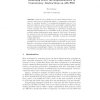283 search results - page 9 / 57 » Effective Program Verification for Relaxed Memory Models |
114
click to vote
ECOOP
2010
Springer
15 years 7 months ago
2010
Springer
ncy Abstractions on x86-TSO Scott Owens University of Cambridge Abstract. With the rise of multi-core processors, shared-memory concurrency has become a widespread feature of compu...
109
Voted
ISCA
2007
IEEE
15 years 9 months ago
2007
IEEE
While Sequential Consistency (SC) is the most intuitive memory consistency model and the one most programmers likely assume, current multiprocessors do not support it. Instead, th...
136
Voted
ICPP
1991
IEEE
15 years 6 months ago
1991
IEEE
The memory consistency model supported by a multiprocessor directly affects its performance. Thus, several attempts have been made to relax the consistency models to allow for mor...
120
Voted
ACTA
2010
15 years 2 months ago
2010
This paper describes an effective verification procedure for imperative programs that handle (balanced) tree-like data structures. Since the verification problem considered is unde...
143
click to vote
ASPLOS
1996
ACM
15 years 7 months ago
1996
ACM
This paper describes Shasta, a system that supports a shared address space in software on clusters of computers with physically distributed memory. A unique aspect of Shasta compa...


